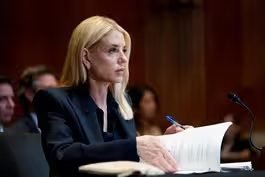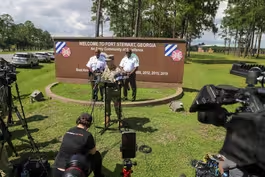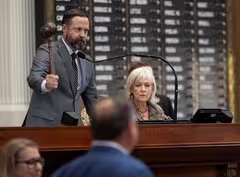
Expert says mRNA funding cut is 'dangerous' health decision
Clip: 8/6/2025 | 7m 51sVideo has Closed Captions
Federal mRNA funding cut is 'most dangerous public health decision' ever, expert says
Many public health experts and scientists say they are stunned by Health Secretary Robert F. Kennedy Jr’s decision to cancel nearly half a billion dollars in federal funding for future vaccine development. MRNA technology was central in the battle against COVID and can be developed more quickly than traditional vaccines. Geoff Bennett discussed the implications with Dr. Michael Osterholm.
Problems playing video? | Closed Captioning Feedback
Problems playing video? | Closed Captioning Feedback
Major corporate funding for the PBS News Hour is provided by BDO, BNSF, Consumer Cellular, American Cruise Lines, and Raymond James. Funding for the PBS NewsHour Weekend is provided by...

Expert says mRNA funding cut is 'dangerous' health decision
Clip: 8/6/2025 | 7m 51sVideo has Closed Captions
Many public health experts and scientists say they are stunned by Health Secretary Robert F. Kennedy Jr’s decision to cancel nearly half a billion dollars in federal funding for future vaccine development. MRNA technology was central in the battle against COVID and can be developed more quickly than traditional vaccines. Geoff Bennett discussed the implications with Dr. Michael Osterholm.
Problems playing video? | Closed Captioning Feedback
How to Watch PBS News Hour
PBS News Hour is available to stream on pbs.org and the free PBS App, available on iPhone, Apple TV, Android TV, Android smartphones, Amazon Fire TV, Amazon Fire Tablet, Roku, Samsung Smart TV, and Vizio.
Providing Support for PBS.org
Learn Moreabout PBS online sponsorshipGEOFF BENNETT: Welcome to the "News Hour."
Many public health experts and scientists say they are stunned by Health and Human Services Secretary Robert F. Kennedy Jr.'s latest decision to cancel nearly half-a-billion dollars in federal funding for future vaccine development.
The latest move comes after the Trump administration already withdrew a multimillion-dollar contract with the biotech company Moderna to develop a bird flu vaccine using what's known as mRNA technology; mRNA vaccines work by using a single strand of genetic code to create a fragment of a virus that sets off the body's immune response.
The technology was central in the battle against COVID and can be developed more quickly than traditional vaccines.
But anti-vaccine communities and skeptics don't trust its safety, and that includes Secretary Kennedy, who canceled more than 20 contracts.
For more on the implications of all this, we're joined by Michael Osterholm.
He's the director of the Center for Infectious Disease Research and policy at the University of Minnesota.
He's also the co-author of the book "The Big One: How We Must Prepare for Future Deadly Pandemics," which will be out in early September.
Thanks for being with us.
DR. MICHAEL OSTERHOLM, Director, University of Minnesota Center for Infectious Disease Research and Policy: Thanks, Geoff.
GEOFF BENNETT: So I want to start with your overall reaction to this.
How critical is mRNA technology and what does the loss of this funding mean for future vaccine development?
DR. MICHAEL OSTERHOLM: Well, let me just set the stage.
I have been in this business for over 50 years on the front lines of public health.
I have served seven different presidential administrations advising them, and I have been through several pandemics.
And I can say unequivocally that this was the most dangerous public health decision I have ever seen made by a government body.
It's really a very, very significant challenge for us.
GEOFF BENNETT: Why is it important to have mRNA vaccines?
Where else do they show promise?
DR. MICHAEL OSTERHOLM: Well, first of all, we have all just been through a pandemic, and we did see what, in fact, the COVID vaccine could do to reduce serious illness, hospitalizations, and deaths.
But the other kind of pandemic that we're very concerned about and you noted in the lead-in with regard to bird flu and the possibility that it could be the next influenza pandemic virus.
Right now, globally, we have the ability to make enough vaccine in about 15 months after an influenza pandemic started to actually vaccinate only about one-fourth of the entire world.
We're still using the 1950s process using embryonated chicken eggs to grow the virus in.
That would be an utter failure.
Now, with the mRNA technology, we believe we could probably have enough vaccine for the whole world within a year, and it would make a big difference.
This is a vaccine that would surely be every bit as equivalent of what we currently have, if not better.
So, there's just one example of where mRNA technology can be helpful.
We have a number of other infectious diseases right now, including some cancer vaccine work that is being done with mRNA technology.
And I think the thing that was most challenging yesterday with regard to Secretary Kennedy's announcement was how he just blatantly said the risks outweigh the benefits, without providing any of those data or providing who it was that actually supported that within the administration or in the scientific community.
GEOFF BENNETT: Well, on that point, Secretary Kennedy said that the mRNA vaccines don't work against respiratory viruses.
Here's a bit of what he had to say.
ROBERT F. KENNEDY JR., U.S. Health and Human Services Secretary: Most of these shots are for flu or COVID, but as the pandemic showed us, mRNA vaccines don't perform well against viruses that infect the upper respiratory tract.
Here's the problem; mRNA only codes for a small part of the viral proteins, usually a single antigen.
One mutation and the vaccine becomes ineffective.
GEOFF BENNETT: So, what does the science actually show?
DR. MICHAEL OSTERHOLM: Well, what happens is, Mr. Kennedy continues to use words that make it sound like he knows what he's talking about, but, in fact, he doesn't.
We know in the pandemic that the COVID vaccines were good, but not great.
No, did they stop everyone from getting infected?
No, did they stop everyone from transmitting the virus?
No.
But did they, in fact, greatly reduce the number of people who got seriously ill, people who had to be hospitalized or people who died?
They were outstanding in that regard.
But that's the same way it is with our current flu vaccines that we have.
Even though they're not mRNA, we have the same thing with seasonal flu.
So any respiratory virus is going to be a challenge and not based just on this technology.
And whereas Mr. Kennedy also alluded to that somehow these vaccines drive the virus to change, again, simply not true.
So, to the average citizen hearing this, they're going to say, wait a minute, maybe I shouldn't get that.
And, remember, we know very well vaccines are important, but they're nothing until they become a vaccination.
So what he also did yesterday, besides cutting this research out, he just created more doubt in the minds of the public about these vaccines, which is absolutely a horrible, horrible situation.
GEOFF BENNETT: Well, you and other public health leaders, as I understand it, are launching an organization called the Vaccine Integrity Project.
What's the goal?
Are you trying to create an alternative framework by which to inform the public about vaccines?
DR. MICHAEL OSTERHOLM: Well, typically, we're what happens in a given seasonal vaccine recommendation, such as we see in the fall with COVID, RSV, and influenza, the medical societies, those in the American Academy of Pediatrics, the Infectious Diseases Society of America, et cetera, take the information that the Advisory Committee on Immunization Practices has generated, extensive work to go back and to look at all the studies that have been done from the previous evaluation point to the current time.
And they're not doing that this year.
And so what our project is all about is, we have 25 of the best and brightest minds from people from around the country.
And we have now come together, evaluated over 17,000 abstracts of information, put this together, and we will be issuing in the next several weeks a full report showing what do we now know from a scientific standpoint about the safety, the effectiveness, the overall ability to use these vaccines that won't be based on this kind of misinformation.
Based on that, then the societies that will then make their recommendations surely have a database now upon which they can rest their case and say, this is why we're making this recommendation.
GEOFF BENNETT: You know, these cuts add to mounting evidence that Secretary Kennedy is pursuing an aggressive anti-vaccine agenda.
What are the risks?
DR. MICHAEL OSTERHOLM: Well, they're incalculable, just because of the fact we're talking about potentially not just a few deaths.
We're talking about many, many, many deaths that would occur.
We worry desperately about his ongoing legacy of just unilaterally deciding, I'm going to know more than you, therefore, I'm telling you, this is what will be available and what it will not be.
And you may recall in the hearings that they had for his confirmation, he promised Senator Cassidy he would not take vaccines away from anyone.
And he's doing that already.
He's already taken them away from pregnant women for COVID, which we know is a very high risk period for severe COVID.
He's taking it away from young children.
So this is a systematic move to just continue to erode the availability of these vaccines.
This is not about politics.
This is about people's lives.
This is about our kids and grandkids.
Every grandparent, every parent in this country right now should be absolutely alarmed by what's happening and whether or not their children or their grandchildren are going to have access to these vaccines in the days ahead.
I think it's an open question.
GEOFF BENNETT: Michael Osterholm.
The forthcoming book is "The Big One: How We Must Prepare for Future Deadly Pandemics."
Thank you for being with us.
DR. MICHAEL OSTERHOLM: Thanks a lot, Geoff.
Composer reimagines Harvey Milk opera while rebuilding life
Video has Closed Captions
Clip: 8/6/2025 | 7m 46s | Composer reimagines his Harvey Milk opera while rebuilding life after traumatic injury (7m 46s)
Former prosecutor questions legitimacy of Bondi Russia probe
Video has Closed Captions
Clip: 8/6/2025 | 10m 29s | Former prosecutor questions legitimacy of Bondi’s Russia probe (10m 29s)
How a county is using AI to help people find common ground
Video has Closed Captions
Clip: 8/6/2025 | 9m 1s | How a Kentucky community is using AI to help people find common ground (9m 1s)
News Wrap: Army sergeant accused of shooting 5 soldiers
Video has Closed Captions
Clip: 8/6/2025 | 7m 17s | News Wrap: Army sergeant accused of shooting 5 soldiers at Fort Stewart (7m 17s)
Politicians pick their voters with partisan redistricting
Video has Closed Captions
Clip: 8/6/2025 | 10m 18s | How politicians are picking their voters with partisan redistricting (10m 18s)
Providing Support for PBS.org
Learn Moreabout PBS online sponsorshipSupport for PBS provided by:
Major corporate funding for the PBS News Hour is provided by BDO, BNSF, Consumer Cellular, American Cruise Lines, and Raymond James. Funding for the PBS NewsHour Weekend is provided by...
















